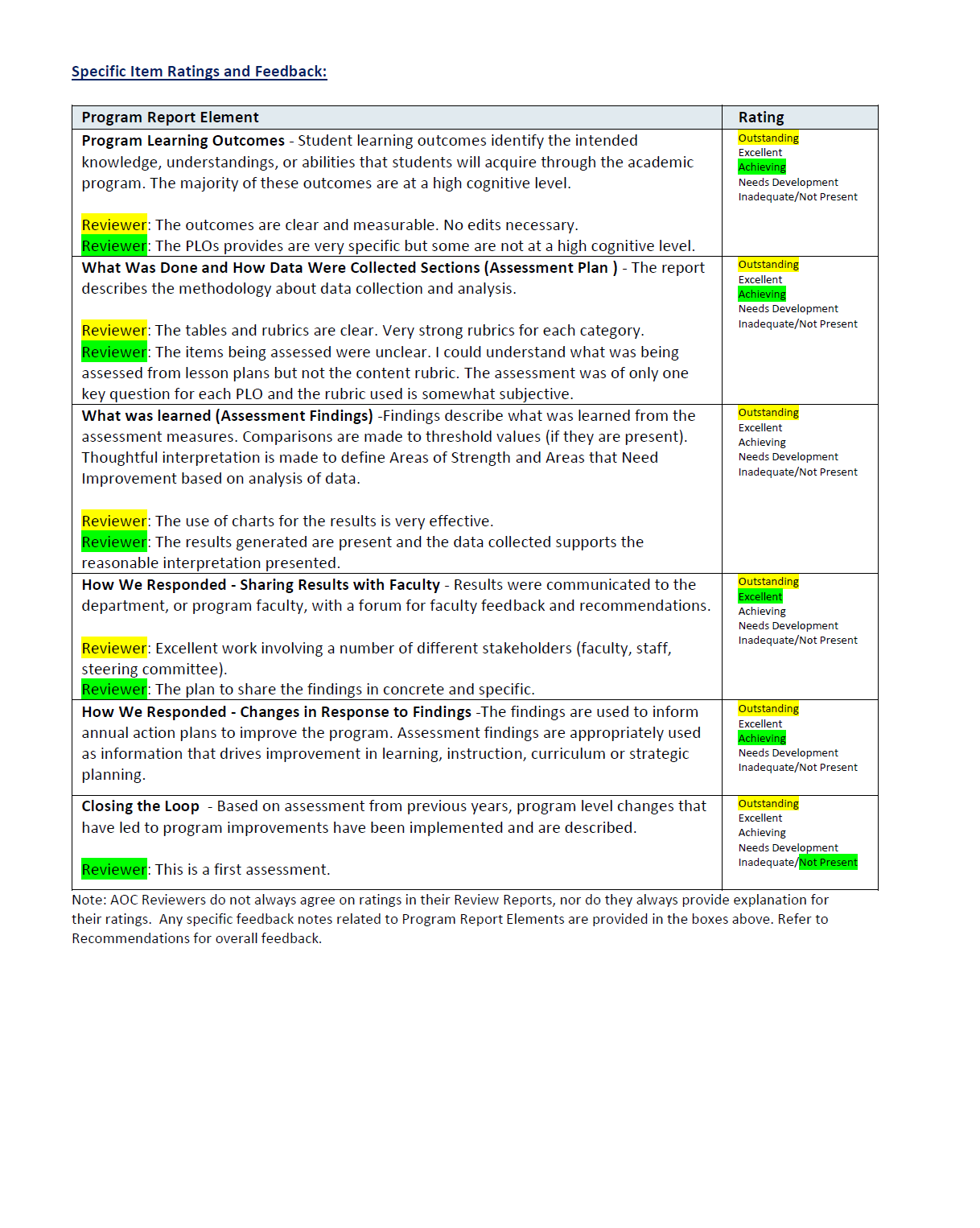Teaching Certificate Program
2023 Annual/Biennial Program Assessment Report
|
Undergraduate Assessment reports are to be submitted annually. The report deadline is October 15th. |
Academic Year Assessed: 2022-2023
College: Letters and Science
Department: Master of Science in Science Education
Submitted by: John Graves
|
Graduate Assessment reports are to be submitted biennially. The report deadline is October 15th. |
Program(s) Assessed
List all majors (including each option), minors, and certificates that are included in this assessment:
Graduate Certificates to be Assessed: Teaching Chemistry; Teaching Climate Science; Teaching Earth Science; Teaching Elementary School Science; Teaching Life Science; Teaching Physics.
*********************************************************
Have you reviewed the most recent Annual Program Assessment Report submitted and Assessment and Outcomes Committee feedback? (please contact Assistant Provost Deborah Blanchard if you need a copy of either one).
*********************************************************
The Assessment Report should contain the following elements, which are outlined in this template and includes additional instructions and information.
- Past Assessment Summary.
- Action Research Question.
- Assessment Plan, Schedule, and Data Source(s).
- What Was Done.
- What Was Learned.
- How We Responded.
- Closing the Loop.
1. Past Assessment Summary.
There is no first round summary of the Program Assessment for the MSSE Certificate Program because this is the first time we have completed an assessment.
2. Action Research Questions.
There are six teaching certificates in MSSE: Chemistry, Climate Science, Earth Science, Elementary School Science, Life Science, and Physics. Chemistry, Earth Science, Elementary School Science, Life Science, and Physics share common Program Learner Outcomes, and two outcomes were assessed for this group. There was one common Program Learner Outcome for the Climate Science Certificate that was shared with the others, and it is reported separately. Each certificate program has its unique course curriculum, with some of the courses applicable to several certificates. Over the 5-year assessment cycle, the goal is to choose assessment items from all courses in all certificate areas (Appendix A).
Action Research Questions:
- Can students illustrate and articulate a thorough understanding of disciplinary teaching in written assignments, specifically on-line discussion posts? This PLO is in all certificates except Climate Science.
- Can students create and write custom disciplinary-specific lesson plans based on course content? This PLO is in all certificates.
3. Assessment Plan, Schedule, and Data Source(s).
Assessment planning, scheduling and data source information was created for the certificates that have all Program Learner Outcomes in common (Table 1) and for the Climate Science Learner Outcomes (Table 3).
Table 1. Assessment Planning Schedule for Chemistry, Earth Science, Elementary School Science, Life Science, and Physics Teaching Certificates.
|
Program Learning Outcomes for Chemistry, Earth Science, Elementary School Science, Life Science, and Physics Teaching Certificates |
COURSES MAPPED TO PLOs |
2022- 2023 |
2023-2024 |
2024-2025 |
2025-2026 |
2026-2027 |
|
Illustrate a thorough understanding of disciplinary concepts at the middle and high school levels as presented through course content. |
TBD |
|
|
|
|
X |
|
Define and apply disciplinary concepts as described in the Next Generation Science Standards. |
TBD |
|
|
X |
|
|
|
Identify that topics in the discipline are linked together and demonstrate how the discipline is connected to other science content through assignments and on-line discussion. |
TBD |
|
|
X |
|
|
|
Illustrate and articulate a thorough understanding and application of disciplinary teaching as evidenced in written assignments and on-line discussions. |
PHSX 573, PHSX 513, BIOE 536, CHMY 593, MB 540 |
X |
|
|
|
|
|
Plan, create, and adapt teaching activities to create custom disciplinary-specific lesson plans using new knowledge and pedagogy from the course content. |
BIOE 585, BIOE 593, CHMY 587, MB 540, MSSE 502, PHSX 597 |
X |
|
|
|
|
The threshold value is for 80% of assessed students scoring at the Achieving level or higher (Table 2).
Table 2. Threshold Values
|
PROGRAM LEARNING OUTCOME |
Threshold Value |
Data Source(s)* |
|
Illustrate and articulate a thorough understanding and application of disciplinary teaching as evidenced in written assignments and on-line discussions.
|
The threshold value for this outcome is for 80% of assessed students scoring at the Achieving or higher |
PHSX 573, PHSX 513, BIOE 536, CHMY 593, MB 540 |
|
Plan, create and adapt teaching activities to create custom disciplinary-specific lesson plans using new knowledge and pedagogy from the course content.
|
The threshold value for this outcome is for 80% of assessed students scoring at the Achieving or higher |
BIOE 585, BIOE 593, CHMY 587, MB 540, MSSE 502, PHSX 597 |
Table 3. Assessment Planning Schedule for Climate Science
|
Program Learning Outcomes for Climate Science Teaching |
COURSES MAPPED TO PLOs |
2022- 2023 |
2023-2024 |
2024-2025 |
2025-2026 |
2026-2027 |
|
Distinguish between weather and climate and identify key components of each. |
TBD |
|
|
X |
|
|
|
Explain how absorption, reflection, and reradiation of solar energy maintain a balance between incoming and outgoing radiation and what is driving current imbalances. |
TBD |
|
|
X |
|
|
|
Describe how imbalances in solar energy receipt drive the movement and distribution of energy on a global scale and how phase changes provide a mechanism for energy transfer. |
TBD |
|
|
|
|
X |
|
Manually observe common weather variables using weather instrumentation and instruct students in the use of weather instrumentation. |
TBD |
|
|
|
|
X |
|
Plan, create, and adapt teaching activities to create custom lesson plans within a community of professional educators using new knowledge and pedagogy. |
ERTH 519, MB 540, PHSX 597 |
X |
|
|
|
|
|
Find and evaluate online sources of weather and climate data and identify trends and drivers in climate data. |
TBD |
|
|
X |
|
|
|
Analyze long-term natural climate variability on various scales and employ natural environmental change as a reference for recent and future changes. |
TBD |
|
|
|
|
X |
|
Develop an understanding of and ability to communicate the current state of climate change and the science surrounding climate change, including the findings of the International Panel for Climate Change’s Current Assessment Report and any recent special reports. |
TBD |
|
|
|
|
X |
The threshold value is for 80% of assessed students scoring at the Achieving level or higher (Table 4).
Table 4. Threshold Values for the Climate Science Certificate
|
PROGRAM LEARNING OUTCOME |
Threshold Value |
Data Source(s)* |
|
Plan, create, and adapt teaching activities to create custom lesson plans within a community of professional educators using new knowledge and pedagogy. |
The threshold value for this outcome is for 80% of assessed students scoring at the Achieving or higher |
ERTH 519 |
4. What Was Done.
The completed assessment is consistent with MSSE’s Certificate Assessment Plan.
At the direction of the MSSE Director, data source artifacts were requested from instructors of courses in each of the certificate areas. The assessment of artifacts was made by a panel of experts chosen from a database of MSSE graduates who received an email requesting interested individuals contact the Director. A panel of 5 graduates were chosen based on the topic of their Capstone research, interaction with MSSE faculty and the science content they teach.
For the PLO addressing the articulation of an understanding of disciplinary teaching in writing and on-line discussions, nine discussion threads from six certificate courses were assessed using the Content Understanding Rubric (Figure 1). The decision was made to exclude written assignments from the assessment because of the overlap between writing for discussion posts and writing lesson plans. We consider the written assignment assessment to be included in both the discussion thread and lesson plan assessment process.
For the PLO addressing content-specific lesson plans, a total of 22 lesson plans from 7 different courses were assessed using the Custom Disciplinary Lesson Plan Rubric (Figure 2).
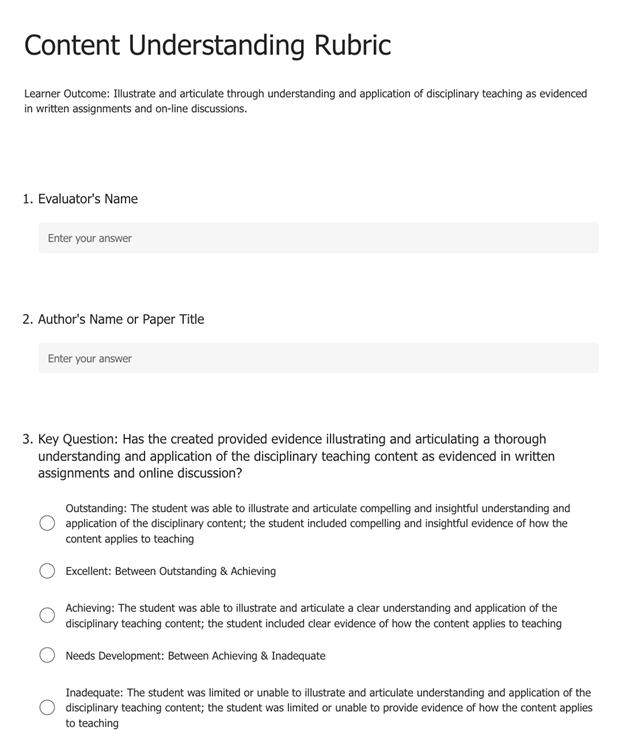
Figure 1. Content Understanding Rubric
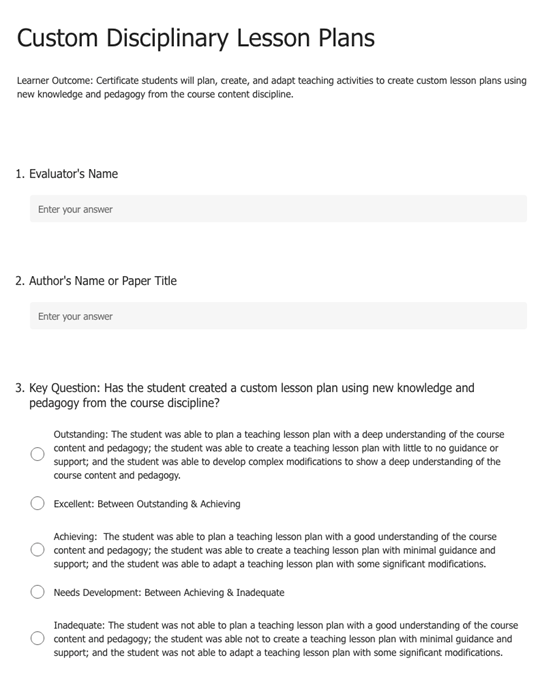
Figure 2. Custom Disciplinary Lesson Plan Rubric
5. What Was Learned.
The results of the disciplinary content understanding learner outcome for all certificates except Climate Science indicated that 90.5% of the students wrote on-line discussion posts at or above the Achieving level. The threshold of 80% of the students meeting the disciplinary content understanding learner outcome was met and exceeded. The number of students scoring Excellent or Outstanding was 59.5%, with 31.1% scoring at the Achieving level (Figure 3).
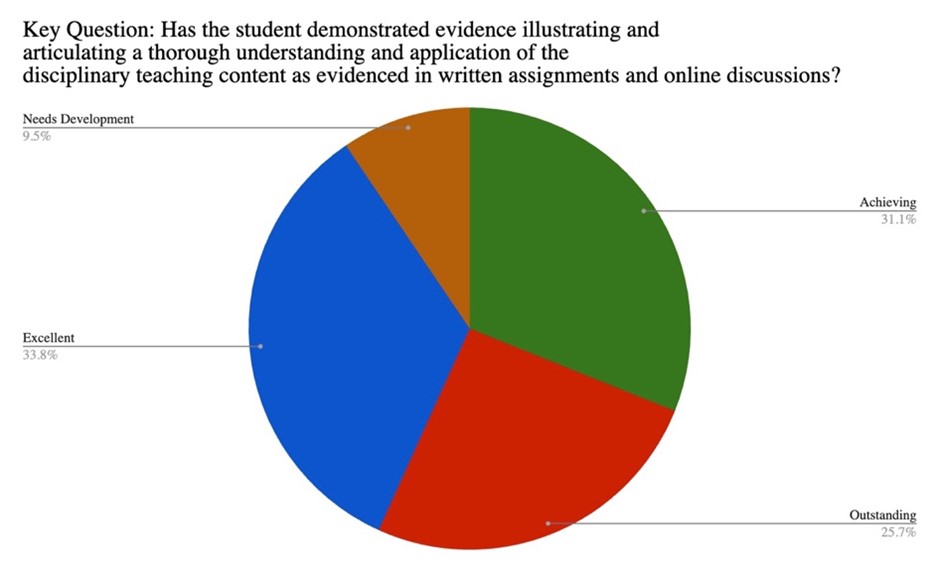
Figure 3. Content Understanding Rubric Results Pie Chart, (n=54).
The results of the science content lesson plan learner outcome for all certificates indicated that 89.7% of the students wrote lesson plans at or above the Achieving level. The threshold of 80% of the students meeting the science content lesson plan learner outcome was met and exceeded. The number of students scoring at the Outstanding and Excellent level was 61.5%, with 28.2% scoring at the Achieving level (Figure 4).
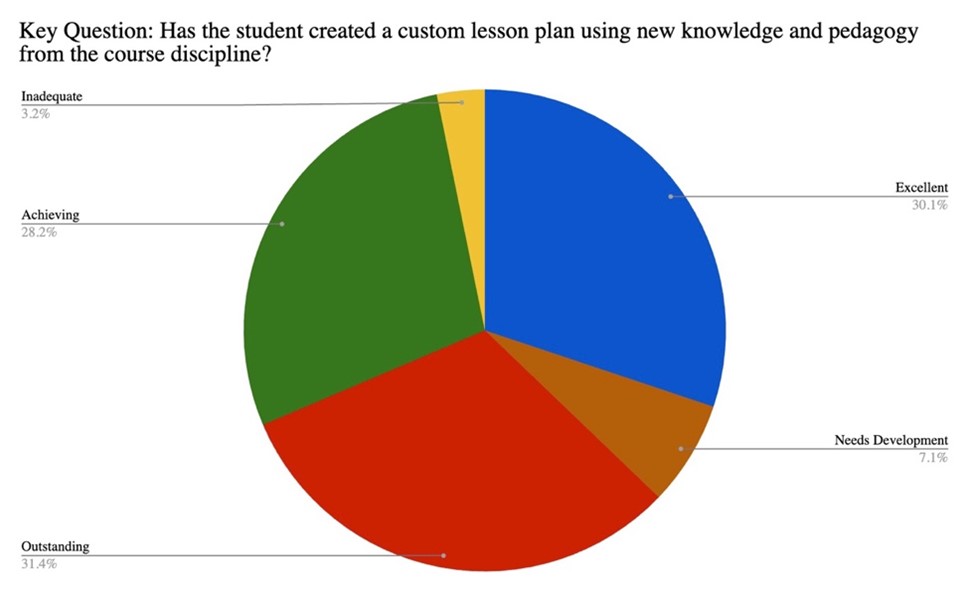
Figure 4. Custom Disciplinary Lesson Plan Rubric Results Pie Chart, (n=156).
The results of the science content lesson plan learner outcome course in the Climate Science certificate indicated that 83.5% of the students wrote lesson plans at or above the Achieving level. The threshold of 80% of the students meeting the science content lesson plan learner outcome was met. The number of students scoring at the Outstanding and Excellent level was 49%, with 34.5% scoring at the Achieving level (Figure 5).
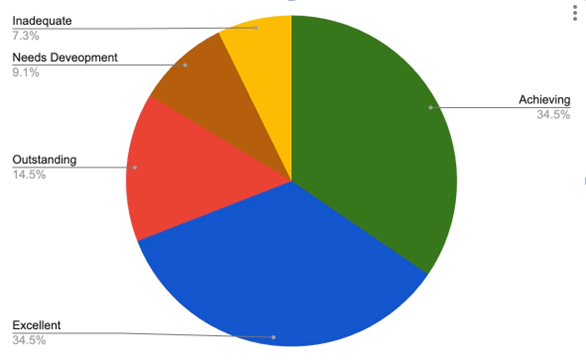
Figure 5. Science Content Lesson Plan Rubric percentages for courses in the Climate Science Certificate, (n=55).
6. How We Responded.
The Program Assessment Report was communicated to faculty and stakeholders as follows:
- The Certificate Program Academic Advisor and MSSE Staff reviewed the data soon after it was compiled
- Core Instructors reviewed the data at the fall Core Instructors Retreat in September 2023
- The MSSE Steering Committee will review the data at their semi-annual meeting in November 2023
- The MSSE faculty will review the data at the Spring 2024 MSSE Instructors Retreat
From the assessment results and anticipated feedback from all stakeholders, we plan to target students performing at the Achieving and below. We plan to address the on-line discussion writing assessment results at the Spring ’24 MSSE Instructor Retreat by incorporating a round table discussion so instructors can share strategies they find useful to promote rich, science content-based discussions and writings.
To address the results of content lesson planning, a presentation on lesson planning will be presented at the Spring 2024 MSSE Instructor Retreat. Examples of lesson plan templates used in education courses will be modeled and shared. A round table discussion about elements of lesson planning for science-content courses will take place.
No information outside of this assessment is necessary for informing programmatic change.
No additional support or resources (e.g. workshops, training, etc.) are needed currently.
7. Closing the Loop(s).
Since this is the first round of assessment, no prior assessment data is available.
At this point, no improvement to these two student learner outcomes seems necessary.
Appendix
Chemistry Certificate Curriculum
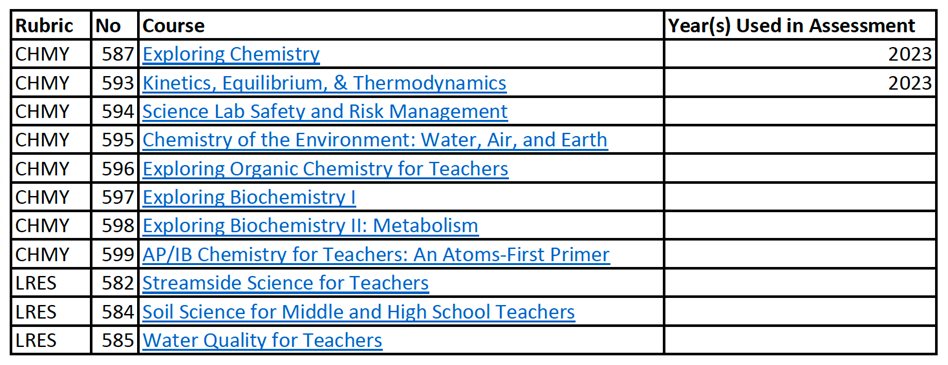
Climate Science Certificate Curriculum
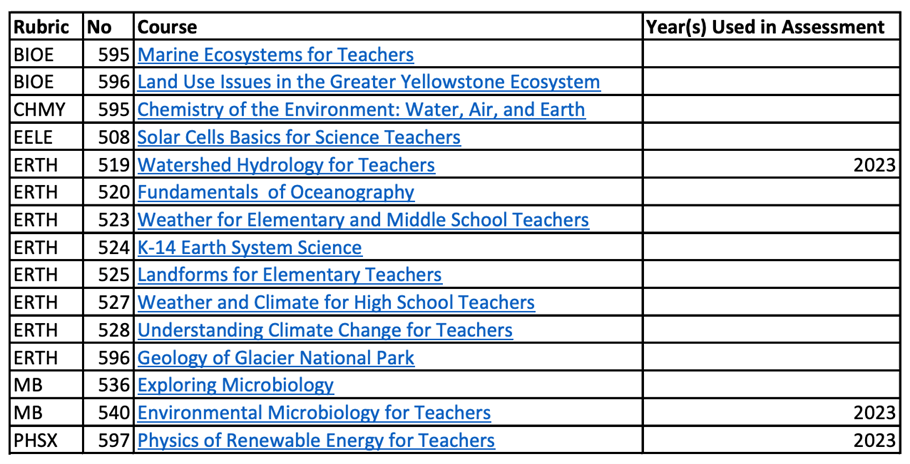
Earth Science Certificate Curriculum
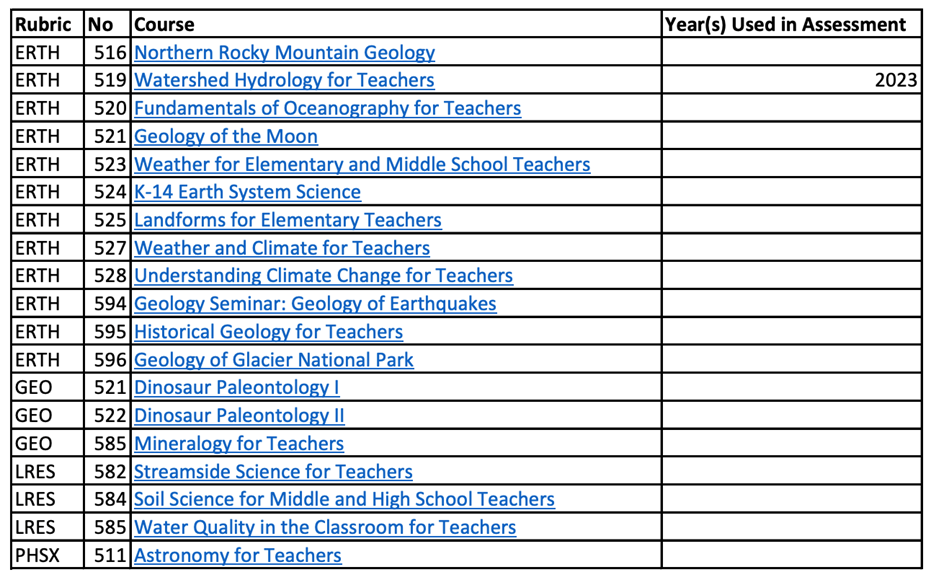
Elementary School Science Certificate Curriculum
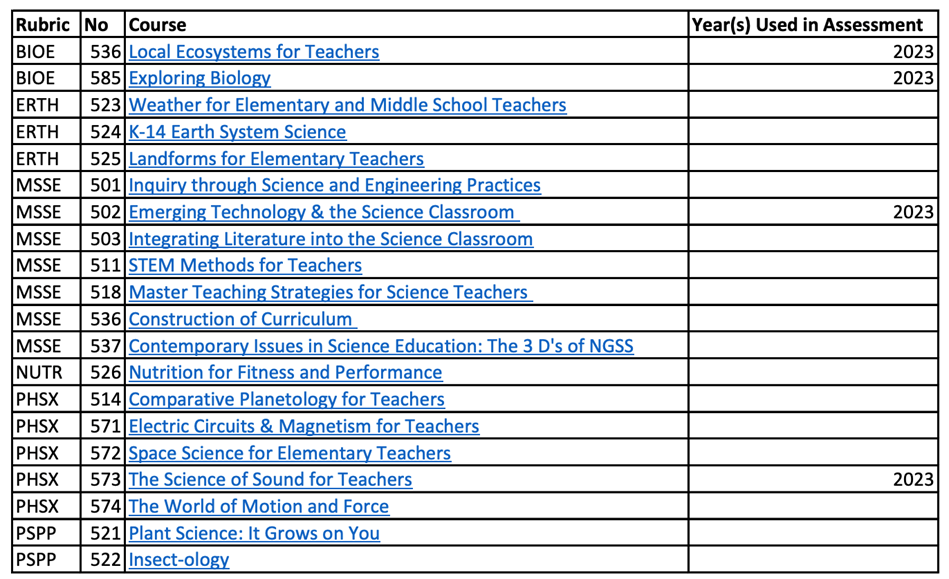
Life Science Certificate Curriculum
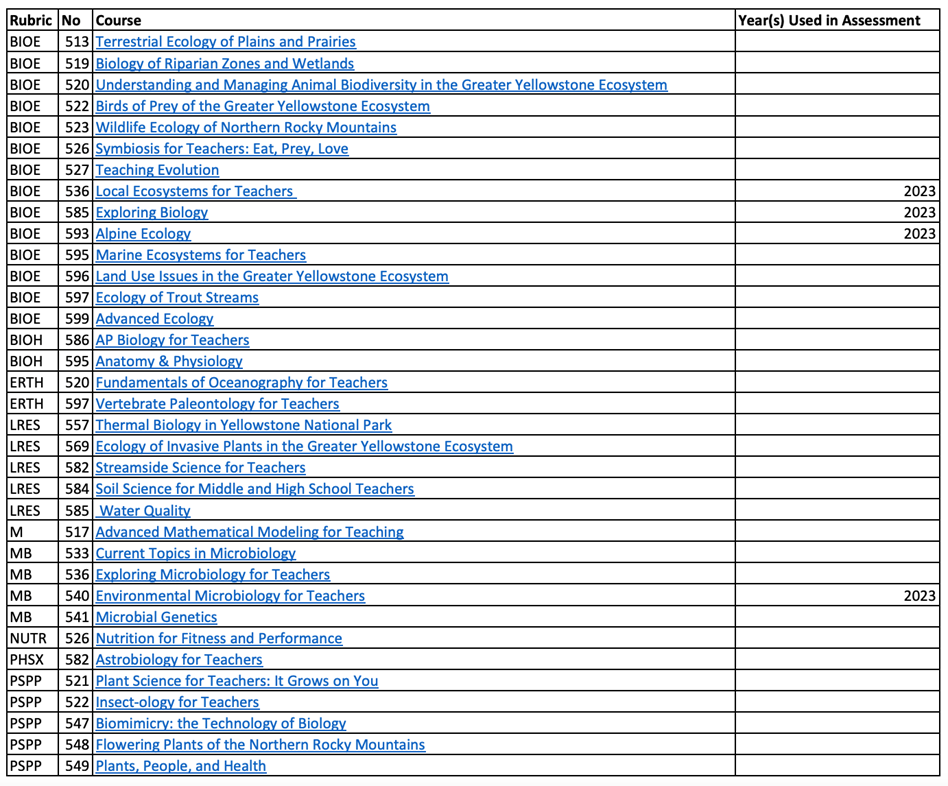
Physics Certificate Curriculum
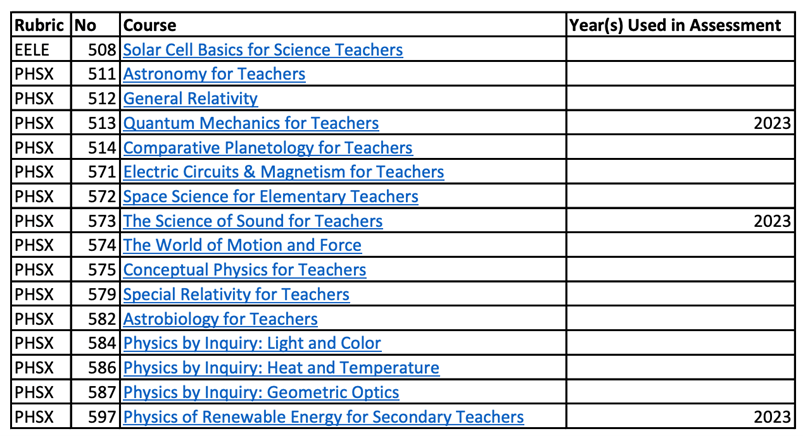
Download a printable version of the 2023 Teaching Certificate Program Annual/Biennial Assessment Report
2023 Annual/Biennial Program Assessment Report Feedback
